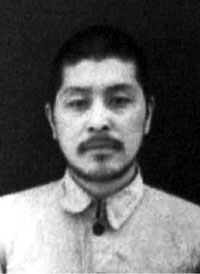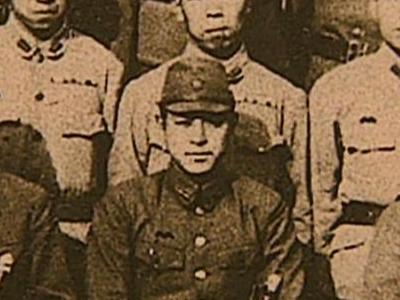Ken Yuasa on:
[Wikipedia]
[Google]
[Amazon]
 Ken Yuasa (
Ken Yuasa (
 Within six weeks of his arrival in China, Yuasa was conducting
Within six weeks of his arrival in China, Yuasa was conducting
Mention of Ken Yuasa's death
{{DEFAULTSORT:Yuasa, Ken 1916 births 2010 deaths Japanese surgeons Japanese military personnel of World War II Military personnel from Saitama Prefecture Japanese prisoners of war Japanese human subject research Prisoners and detainees of the People's Republic of China
 Ken Yuasa (
Ken Yuasa (Japanese
Japanese may refer to:
* Something from or related to Japan, an island country in East Asia
* Japanese language, spoken mainly in Japan
* Japanese people, the ethnic group that identifies with Japan through ancestry or culture
** Japanese diaspor ...
: 湯浅 謙) (October 23, 1916 – November 2, 2010) was a World War II
World War II or the Second World War, often abbreviated as WWII or WW2, was a world war that lasted from 1939 to 1945. It involved the vast majority of the world's countries—including all of the great powers—forming two opposin ...
surgeon
In modern medicine, a surgeon is a medical professional who performs surgery. Although there are different traditions in different times and places, a modern surgeon usually is also a licensed physician or received the same medical training as ...
for the Japanese army who had been a member of the infamous Unit 731
, short for Manshu Detachment 731 and also known as the Kamo Detachment and Ishii Unit, was a covert biological and chemical warfare research and development unit of the Imperial Japanese Army that engaged in lethal human experimentatio ...
. During his service in occupied China
China, officially the People's Republic of China (PRC), is a country in East Asia. It is the world's most populous country, with a population exceeding 1.4 billion, slightly ahead of India. China spans the equivalent of five time zones and ...
, he (along with at least 1000 other doctors and nurses) conducted vivisections on Chinese prisoners and civilians, and provided typhoid
Typhoid fever, also known as typhoid, is a disease caused by '' Salmonella'' serotype Typhi bacteria. Symptoms vary from mild to severe, and usually begin six to 30 days after exposure. Often there is a gradual onset of a high fever over several ...
and dysentery
Dysentery (UK pronunciation: , US: ), historically known as the bloody flux, is a type of gastroenteritis that results in bloody diarrhea. Other symptoms may include fever, abdominal pain, and a feeling of incomplete defecation. Complications ...
bacilli
Bacilli is a taxonomic class of bacteria that includes two orders, Bacillales and Lactobacillales, which contain several well-known pathogens such as ''Bacillus anthracis'' (the cause of anthrax). ''Bacilli'' are almost exclusively gram-positive ...
to the Japanese army for use in biological warfare
Biological warfare, also known as germ warfare, is the use of biological toxins or infectious agents such as bacteria, viruses, insects, and fungi with the intent to kill, harm or incapacitate humans, animals or plants as an act of war. Bio ...
. Years after the war, he began to realize the extent of the atrocities he and others had committed and began writing, and speaking throughout Japan, about his experiences.
Early years
Yuasa was born inSaitama prefecture
is a landlocked prefecture of Japan located in the Kantō region of Honshu. Saitama Prefecture has a population of 7,338,536 (1 January 2020) and has a geographic area of 3,797 km2 (1,466 sq mi). Saitama Prefecture borders Tochigi Prefecture ...
and grew up the son of a doctor in Kyōbashi, Tokyo
is a neighborhood east of Tokyo Station in Chūō, Tokyo, Japan. It is one of the city's oldest commercial districts, although it has since been eclipsed by Ginza to the south and Nihonbashi to the north.
Kyobashi, together with Nihonbashi and ...
. He decided to follow his father's example and, after graduating from Jikei University's School of Medicine in March 1941, became a doctor. He had originally hoped to become a rural practitioner traveling to remote villages that had no doctor and helping to treat underprivileged patients. However, along with the vast majority of able-bodied young men in Japan, he was soon drafted into the Imperial Army.
War experiences
 Within six weeks of his arrival in China, Yuasa was conducting
Within six weeks of his arrival in China, Yuasa was conducting vivisection
Vivisection () is surgery conducted for experimental purposes on a living organism, typically animals with a central nervous system, to view living internal structure. The word is, more broadly, used as a pejorative catch-all term for experiment ...
s of unanaesthetised prisoners. The Japanese army believed in the importance of performing operations on live prisoners as a way of learning how to better care for Japanese field casualties. Yuasa's first vivisection was in March 1942 in the army hospital in Changzhi
Changzhi () is a prefecture-level city in the southeast of Shanxi Province, China, bordering the provinces of Hebei and Henan to the northeast and east, respectively. Historically, the city was one of the 36 administrative areas (see Administrat ...
(formerly Luan) in Shanxi Province
Shanxi (; ; Chinese postal romanization, formerly romanised as Shansi) is a landlocked Provinces of China, province of the China, People's Republic of China and is part of the North China region. The capital and largest city of the province is ...
. Two Chinese prisoners—a younger man and an older man—were handcuffed to operating tables while 20 other doctors and nurses observed. First, an appendectomy
An appendectomy, also termed appendicectomy, is a Surgery, surgical operation in which the vermiform appendix (a portion of the intestine) is removed. Appendectomy is normally performed as an urgent or emergency procedure to treat complicated acu ...
was performed on one of the conscious patients, after which the doctor sutured the wound; then a tracheotomy
Tracheotomy (, ), or tracheostomy, is a surgical airway management procedure which consists of making an incision (cut) on the anterior aspect (front) of the neck and opening a direct airway through an incision in the trachea (windpipe). The ...
was demonstrated. Yuasa went on to perform an amputation
Amputation is the removal of a limb by trauma, medical illness, or surgery. As a surgical measure, it is used to control pain or a disease process in the affected limb, such as malignancy or gangrene. In some cases, it is carried out on indi ...
of the right arm of one of the prisoners. Yuasa admits being afraid during the course of this vivisection, but by his third trial, he admits to being a willing participant. He recalls another operation, in which he operated on a Chinese prisoner, who had been deliberately shot for use as practice for a "real situation". Yuasa was under orders not to use anesthesia.
Yuasa was later put in charge of a clinic where he repeatedly dissected "Communists" delivered to him by the police upon request, all for practice purposes. The "Communists" were Communist sympathizers or ordinary criminals - the majority were Chinese and many were Russian. Yuasa has said that, in all, he participated in six such vivisections. Aside from this practice of vivisection, Yuasa also cultivated typhoid germs and supplied these to Japanese troops; the bacterial culture tubes were used to contaminate wells and ponds of villages in Communist-held territory. Japanese soldiers also became ill; 1,700 died of the diseases.
Recalling his wartime experiences with Chinese prisoners, Yuasa spoke of how he and his colleagues "laughed and joked" during the vivisections, stating further that "we didn't think there was anything strange about it." In a 1997 interview, Yuasa also spoke of his experiences with " comfort stations", stating that the majority of Japanese soldiers felt no hesitation in treating non-Japanese comfort women as sex objects and inflicting violence against them, but that there were rare cases of soldiers developing an intimate relationship with a comfort woman and treating them with less cruelty.
After the war ended, Yuasa became a prisoner of war
A prisoner of war (POW) is a person who is held captive by a belligerent power during or immediately after an armed conflict. The earliest recorded usage of the phrase "prisoner of war" dates back to 1610.
Belligerents hold prisoners of wa ...
in Handan
Handan is a prefecture-level city located in the southwest of Hebei province, China. The southernmost prefecture-level city of the province, it borders Xingtai on the north, and the provinces of Shanxi on the west, Henan on the south and Shando ...
, China. He was compelled by his captors to record on paper all of the atrocities he had committed as a doctor in China. It was not until he began to write down in detail his past actions, that he began to realize the magnitude of what he had committed, although he said that he was still in denial about much of his actions at this time. He later transferred to a POW camp in Taiyuan
Taiyuan (; ; ; Mandarin pronunciation: ; also known as (), ()) is the capital and largest city of Shanxi Province, People's Republic of China. Taiyuan is the political, economic, cultural and international exchange center of Shanxi Province. ...
, where he married another POW in 1952. Around this time, Yuasa received a letter from the mother of one of the men he had murdered by vivisection describing the horror she felt when her son was abducted by Japanese military police; this caused Yuasa to weep. Eventually, in 1956, he was released and returned to Japan.
Yuasa was deeply apologetic about what he did.
Post-war activism
Hoping to act as a reminder to Japan that these atrocities must never be repeated, Yuasa was one of a handful of doctors who eventually confessed their crimes to the Japanese public and the world. Subsequent to his return to Japan in the 1950s, he publicly detailed the army's atrocities. He received harassment and even some violent threats from Japaneseultranationalists
Ultranationalism or extreme nationalism is an extreme form of nationalism in which a country asserts or maintains detrimental hegemony, supremacy, or other forms of control over other nations (usually through violent coercion) to pursue its s ...
, and was advised by former colleagues at the Luan army hospital to "go easy" on his revelations. Yuasa also expressed criticism of regulations forcing schools to use the Japanese flag and anthem in schools, which he compared to the uniformity of his own education. Until his death, Yuasa continued touring Japan to tell audiences of his wartime experiences.
See also
*Akira Makino (November 1922 – May 2007) was a former medic in the Imperial Japanese Navy who, in 2006, became the first Japanese ex-soldier to admit to the experiments conducted on human beings in the Philippines during World War II.
Early life
Makino w ...
*Japanese war crimes
The Empire of Japan committed war crimes in many Asian-Pacific countries during the period of Japanese militarism, Japanese imperialism, primarily during the Second Sino-Japanese War, Second Sino-Japanese and Pacific Wars. These incidents have b ...
*Unit 731
, short for Manshu Detachment 731 and also known as the Kamo Detachment and Ishii Unit, was a covert biological and chemical warfare research and development unit of the Imperial Japanese Army that engaged in lethal human experimentatio ...
Sources
Mention of Ken Yuasa's death
{{DEFAULTSORT:Yuasa, Ken 1916 births 2010 deaths Japanese surgeons Japanese military personnel of World War II Military personnel from Saitama Prefecture Japanese prisoners of war Japanese human subject research Prisoners and detainees of the People's Republic of China